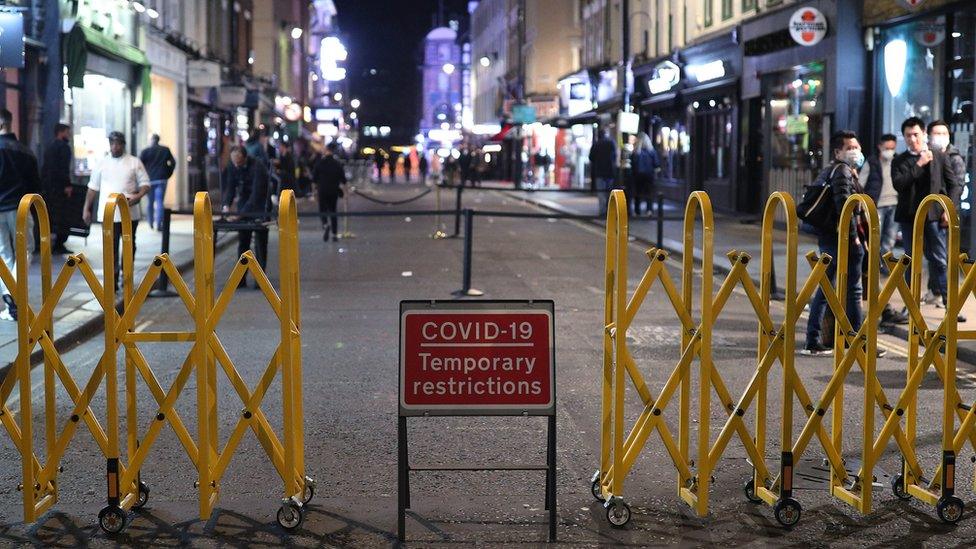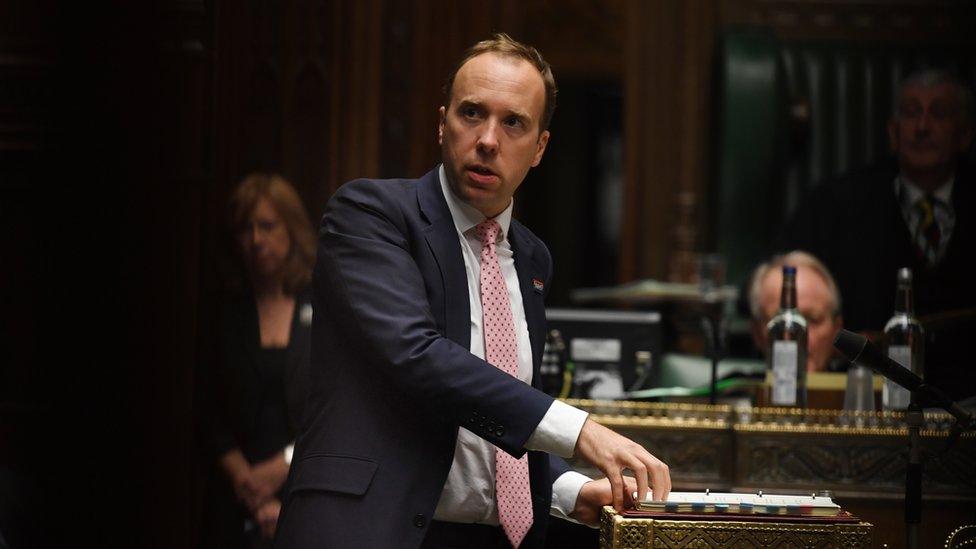Coronavirus: MPs promised vote on new rules 'wherever possible'
- Published
- comments

Part of a London street is cleared of diners ahead of the 22:00 BST curfew
Health Secretary Matt Hancock has promised MPs votes "wherever possible" on England or UK-wide coronavirus rules before they come into force.
But he warned that some urgent regulations could not be held up.
It follows concern from Tory MPs over a lack of parliamentary scrutiny, while the Commons Speaker warned the government against treating Parliament with "contempt".
MPs voted to extend the coronavirus powers by 330 votes to 24.
Mr Hancock was speaking in the House of Commons ahead of a vote on a motion that will extend the Coronavirus Act.
The emergency legislation passed in March grants extensive powers to the authorities to tackle Covid, such as closing schools and stopping mass gatherings.
Addressing MPs, the health secretary said: "I am sure that no member of this House would want to limit the government's ability to take emergency action in the national interest as we did in March.
"And we will continue to involve the House in scrutinising our decisions in the way the prime minister set out last week, with regular statements and debates and the ability for members to question the government's scientific advisers more regularly.

Health Secretary told MPs they would get a vote "wherever possible"
"And I hope the new arrangements will be welcomed on all sides of the House and I will continue to listen to colleagues' concerns, as I've tried my best to do so throughout."
Sir Graham Brady, chair of the 1922 committee of backbench Conservative MPs, had been pushing for MPs to have more of a say over restrictions introduced to tackle the virus.
He welcomed Mr Hancock's announcement saying: "We are grateful that he and other members of the government have understood the importance of proper scrutiny in this place and the benefits that can bring to better government as well."
Asked by a former Conservative chief whip Mark Harper for clarity on which new rules MPs would be allowed to vote on, Mr Hancock said "I hope over the weeks to come we will demonstrate through our actions and what we bring forward that we are true to this commitment, which essentially will become a new convention."
Other Conservatives expressed frustration with the government. Sir Charles Walker said the 90 minutes provided for the debate was "just not good enough" while Sir Bernard Jenkin warned that "the prime minister cannot lead his parliamentary party unless he has their consent".
Labour's shadow home secretary Nick Thomas-Symonds said: "We recognised that the government, in a pandemic, any government needs extraordinary powers available, and why with a heavy heart today, facing this highly unsatisfactory situation of an all or nothing motion, we will not be blocking its passage today."
However, the Liberal Democrats have said they would vote against extending the Coronavirus Act because of the power it gave ministers to "reduce rights" for carers.
Seven Conservatives and six Labour MPs also voted against the motion.
Dozens of Tory MPs backed an amendment to the motion by Sir Graham calling for future regulations affecting the whole of England only to be introduced if Parliament has the opportunity to debate and vote on them in advance.
Commons Speaker Sir Lindsay Hoyle did not select the amendment explaining that any amendment to the motion risked creating uncertainty about the legality of the Act, and potentially opened it up to court challenge.
However he told MPs: "The way in which the government has exercised its powers to make secondary legislation during this crisis has been totally unsatisfactory.
"All too often important statutory instruments have been published a matter of hours before they come into force and some explanations as to why important measures have come into effect before they can be laid before this House has been unconvincing and shows a total disregard for the House."
He said he was "now looking to the government to rebuild trust with the House not treat it with the contempt it has shown".
Responding to Sir Lindsay Hoyle's criticism, the prime minister's spokesman said the government was "looking at further ways to involve parliament in the process in advance".